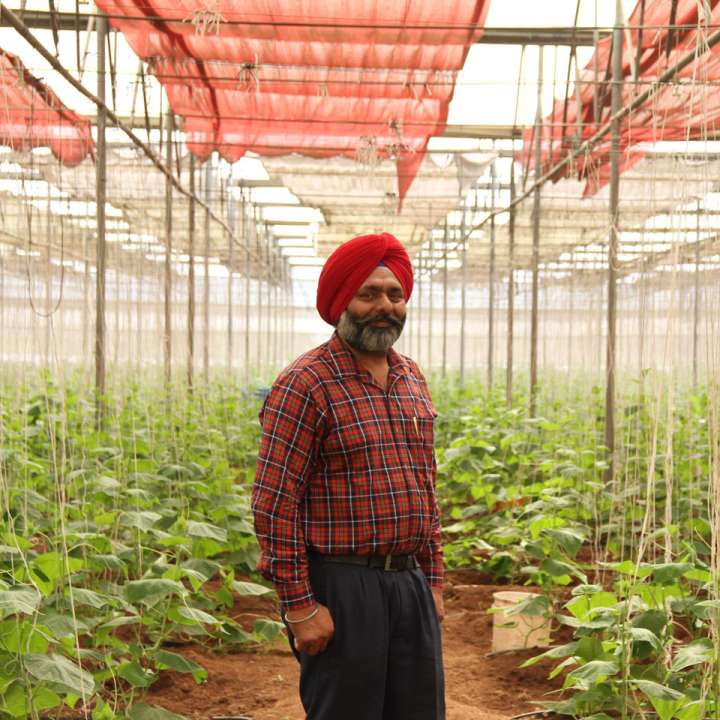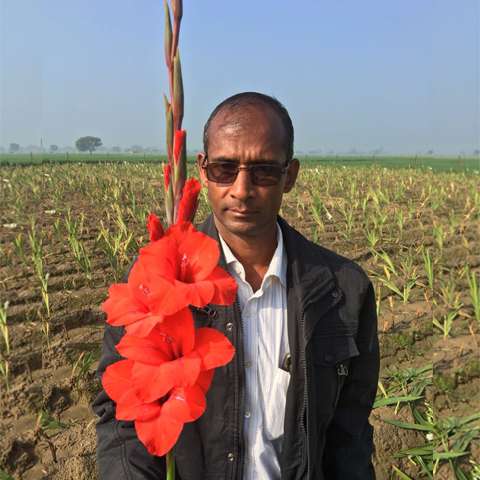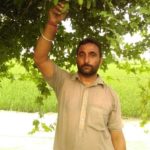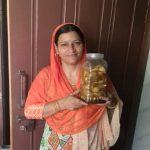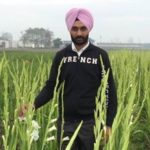Farmer Achieving Success by Implementing Foreign Agriculture Model in India
Proliferated common mentality among the Indians is to go abroad and get settled there, no matter what they got to do there, whether it’s a cleaning job or any other type of labour job, but if the same work is offered in their own country then they feel ashamed. Yeah, the fact is true that there is more money in working abroad, but what if we bring the foreign technology to our homeland and make our profession a profitable venture. This is the story of a Malwa Region based farmer, Davinder Singh, 46, who very well utilized the opportunity of visiting abroad and brought back the foreign agriculture model back to Punjab.
In 1992, Davinder Singh planned to go abroad, but he was failed with his efforts and at last, decided to start farming. At that time he was unaware from the fact that living in abroad was not that easy because it demands hard work, but making a good profit from agriculture was also not that easy anymore, as agriculture demands sweat and blood both. Though he started farming, when it came to marketing, then from the fear of getting cheated from the middlemen he decided to hold beam balance in his own hands.
“I cannot forget my first experience of visiting the sabzi mandi (vegetable market) of Sector 42, Chandigarh, with mother’s given white dhurrie (carpet), beam balance and a sack of green chillies. I sat there the whole day, I was so confused and ashamed, whether to take money from the customer or not. I was mum. After observing me like this, few of my farmer brothers told me that this is not going to work like this, you have to call out your customers and shout out loud your crop’s selling price; this is how I learned to sell vegetables.”
Moving forward with the staggering steps that season, Davinder Singh earned 45 thousand rupees from his first crop and he was very happy with it. Well, till that time, Davinder Singh already came to know that the path of agriculture is going to demand lots of strength and determination. Without turning back, Davinder Singh started working hard and passionately. Slowly with the time he expanded his farming area and to upgrade his skills he visited Spain in 2007 for a training camp with one of his friends.
In Spain, he observed the agriculture model and he was very amazed by it. Without missing any piece of information, Davinder Singh jotted everything in his notes.
“I observed that the agriculture model which is being practices in Italy is very different from India. Farmers work in groups, and there are no middlemen in the agriculture model of Italy. I also observed that the climatic condition in Italy was not that favourable for agriculture as compared to India, still, they were taking high productivity from their fields. People were using POLY-HOUSE to give an ideal atmosphere to the crops for their growth and development. Seeing all this was very surprising to me.”
After exploring the remarkable agriculture techniques, Davinder Singh decided that he will go the POLY-HOUSE way. In the beginning, he got no assistance for poly-house creation, so he decided to make it himself. With the help of bamboos, he established his own poly-house at 500 square metres and started planting vegetables in it. When the nearby people came to know about it many experts also visited his farm but they returned with negative feedback and said that this POLY-HOUSE is not going to be successful. But still, Davinder Singh with his hard work and passionate spirit made it successful and took good yield from it.
The next stage on which Davinder Singh stepped on was group formation in 2010, he slowly expanded the work in the people and groups whoever deserved to learn the poly-house technology under Agro Help Aid Society Mushkabad Group. This step of Davinder Singh was a very wise step, as his group started getting seeds, fertilizers and other necessary agricultural input at 25 to 30% subsidized rate. Moreover, all the farmers who are the member of the group now don’t have to knock on different doors to gather the agricultural inputs, they get everything under one roof. Group formation provided more benefits to the farmers on transportation charges, marketing, packaging, and as a result, one farmer doesn’t get overburdened with the expenses. Farmers Agri Mart is the brand name under which all the crops harvested by the group is sold in the vegetable markets of Chandigarh and Delhi, people trust their brand and they don’t have to make extra efforts.
When I was alone at that time marketing level was different but today we have a group and marketing is easy in the group, but in group quality matters. GROUP is a very powerful thing because everything gets shared in the group except profit. – Said by Davinder Singh Mushkabad
In the span of 20 years, Davinder Singh’s efforts have made him reach from the level of an ordinary vegetable seller to the head of Agro Help Aid Society Mushkabad Group under which currently there are 230 farmers. Starting from a small area, presently he has expanded his farming zone into a larger extent out of which poly-house farming is done at 5 ½ acres and other than this he has mechanized some modern agriculture technologies like drip irrigation, sprinklers to properly manage the water distribution. For his success, he gives a huge credit to PAU, Ludhiana, and their organized events and fairs which supported him with good knowledge bank.
Today, Davinder Singh’s group has become a model of diversification in agriculture sector, with their innovative technologies and sustainable agriculture methods. For his tremendous efforts in the field of horticulture, Davinder Singh has been honoured with many prestigious awards and has attended many delegation meetings in abroad.
• Also visited Baki, Azerbaijan as a progressive Farmer member of the Delegation led by Ministry of Agriculture, Govt. of Punjab, in October 2016.
When it comes to water management then water plays the major role in farming. Farmer has to get his water checked and after that get his own tank established from the canal water and use it in poly-house, it results in increase in income up to 25-30%.
Future Plan
Planning to provide home delivery to the consumers so that they can eat fresh vegetables rich in nutrients with fewer chemicals.
While sharing his farming experience with Apni Kheti, Davinder Singh also shared a happy moment of his life story with us – “Earlier I used to dream about going foreign, even not knowing that what exactly I have to do there! But later, when I visited as a delegation team member to Malaysia and other countries then I felt so happy and proud, it was like a dream come true. I realized the difference between “going abroad to do labour work” and “going abroad as a member of delegation team”.


